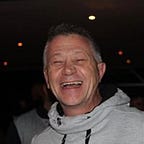How we react to voices of authority is largely determined by our upbringing.
As an Afrikaner born in 1963, I was raised in a disciplined environment. There’s something to be said for most white Afrikaans speaking folks’ high family values, especially back then . My parents had the foresight to raise their four kids fluent in both English and Afrikaans. Besides the normal advantages that being bilingual affords, had an unexpected outcome.
Language sits at the root of any nationality’s culture. It shapes and forms the people and their identity through a common- and exclusive -means of communication . By definition. that exclusivity sets them apart from other nations and cultures. Our Afrikaans upbringing was strict, authoritarian, and conservative. Our English influence was more open-minded and inclusive. The dichotomy of these two cultures has allowed us a worldview with a foot in each camp, able to switch from one to the other undetected, so to speak .
From a young age, respecting anyone in a position of authority was mandatory. Whether it was a policeman, a nurse, a teacher, or a preacher, they deserved the utmost respect. Regardless of race or gender, we respected all adults. In the Afrikaans camp, any adult had the right to correct any child that was misbehaving. By creating a culture that can best be summed up in the word, “was formed. Because Afrikaners are all “ Volk “ — each person looking out for the greater good of the tribe-a strong bond “— they can set and hold themselves to their own high family values.
The English influence was split between the European immigrants that came to the country in the 1940s and 50s and naturalised South Africans that spoke English . Many Greeks, Portuguese, Italian, Lebanese, Scottish, and English families brought their skills to help build the country. Many Jewish families had also formed a community in South Africa and called it home. They started many businesses and industries in the country. These provided much of the employment that drove the economy. With such entrepreneurial flair for business, their influence on the country is undeniable.
Sadly , for reasons I wish were not so, I passed up the opportunity to be more influenced by my fellow black and coloured South Africans . As diverse and multifaceted as my life has been, how much more could I have learned at the feet of a wise madala or How much more inclusive and informed I would be. White folks that speak a native language, have greater respect for the heritage and dignity of the people . Their wisdom, love of the land and depth of character are revered .
We don’t learn anything worthwhile without listening.
Having a healthy respect for the voices of authority is a great place for dialogue to start. But every South African is a Voice of Authority. You have a voice and a view that is only yours. You are the authority on that view. For me to learn, I must listen-to understand your view. There are so many diverse nationalities and cultures in South Africa, we’ll all still be learning for many years to come .
I love reading and learning. All reading is not learning but to learn, you must read. The best instruction manual on life I’ve ever read is The Bible. My older Brother gave me my first own Bible — The Good News for Modern Man — back in 1974. The Book is about people with voices of authority. Not the priests, leaders, or elders, but the murderers, prostitutes, and corrupt tax collectors . Everyone has a voice.
To move forward and create a country that is inclusive, fair, and just for everyone, we must learn to listen. The voice of authority is the person next to you. Reach out and start a #dialogue. I promise you’ll learn something new.
Have an awesome weekend and please be generous! 😄
As always, thanks for reading 🙏
Originally published at https://www.leapfirst.co.za on August 20, 2021.
